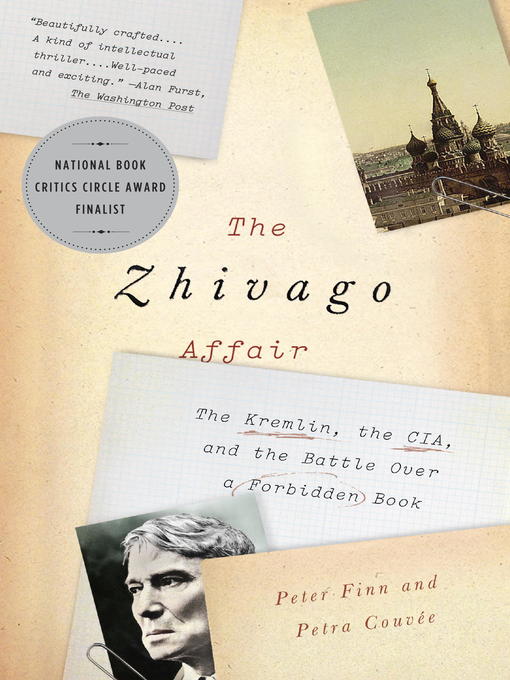
The Zhivago Affair
The Kremlin, the CIA, and the Battle Over a Forbidden Book
کتاب های مرتبط
- اطلاعات
- نقد و بررسی
- دیدگاه کاربران
نقد و بررسی

Starred review from March 17, 2014
In brisk and thrilling fashion, Washington Post national security editor Finn and Saint Petersburg State University instructor Couvée take readers into the world of Soviet intelligentsia and shadowy Cold War politics to study how Boris Pasternak came to write and publish Doctor Zhivago (which first appeared in Italy in 1957). The authors use rich archival research, including previously classified CIA files, to depict the oppressive political conditions that gave rise to Pasternak’s masterpiece, and the international firestorm that occurred when the novel was banned in the Soviet Union. The book offers nuanced depictions of the people in Pasternak’s life, including his lover, Olga Ivinskaya, who championed his work and shared his torment at the hands of the KGB. The torturous ideological policing by the Soviets is discussed to great effect; for indeed, the tale of Doctor Zhivago itself is very much about the long psychic scar left by Russian Revolution. It’s a story expertly told by Finn and Couvée, who unsparingly present the role played by the Kremlin in persecuting Pasternak and his loved ones, as well as the role of the CIA in using his masterpiece in a game of ideological warfare—overall, a triumphant reminder that truth is sometimes gloriously stranger than fiction. Agent: Rafe Sagalyn, Sagalyn Literary Agency.

April 15, 2014
The derring-do-packed history of "one of the first efforts by the CIA to leverage books as instruments of political warfare." In the 1940s, poet and translator Boris Pasternak (1890-1960) set out to write an epic of the "incredible time" during the years surrounding Russia's revolution. The result was Doctor Zhivago, "a sad, dismal story," as he put it, about a poet-physician and his personal and political trials during four decades of upheaval and repression. Washington Post national security editor Finn and teacher and translator Couvee chronicle the intrigue over the book's publication in Europe, its initial reception and the vociferous opposition it generated in the Soviet Union. Though Pasternak anticipated significant censure, he insisted that his manuscript be smuggled to the Italian editor who agreed to publish it and serve as international agent. The book, Pasternak said, had "become the most important thing in my life." He wanted it "to travel over the entire world...lay waste with fire the hearts of men." An immediate best-seller in Italy in 1957, it was acclaimed in Germany, England and France; the following year, the microfilmed manuscript arrived at CIA headquarters. The CIA had long been translating, publishing and sending to Russia books with a "humanistic message" of freedom of opinion and personal respect. "Books were weapons" in the Cold War, the agency maintained. Although publishing Zhivago proved convoluted and frustrating, the agency managed to send several hundred copies to the 1958 World's Fair in Brussels, where the Vatican Pavilion agreed to cooperate: From a table behind curtains at the back, Russian visitors eagerly grabbed their contraband. Soviet response was swift and crushing, intensifying after Pasternak was awarded the Nobel Prize for Literature in 1958. Denounced as a snob, a "bourgeois individualist" and a traitor, he was expelled from the prestigious writers' union and shunned even by those he had considered friends; his long-suffering wife and mistress feared for their lives. A fast-paced political thriller about a book that terrified a nation.
COPYRIGHT(2014) Kirkus Reviews, ALL RIGHTS RESERVED.

January 1, 2014
Given Doctor Zhivago's incendiary take on the Russian Revolution, master poet Boris Pasternak arranged for his single novel to be smuggled out of the Soviet Union in 1956 and published abroad in translation. But the CIA recognized its ideological importance and in 1958 smuggled a Russian edition back across the border. The authors had access to otherwise closed CIA files to write this book.
Copyright 2014 Library Journal, LLC Used with permission.

























دیدگاه کاربران